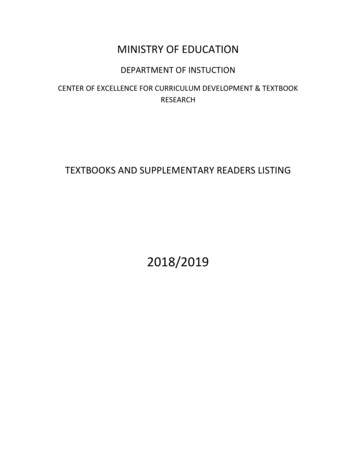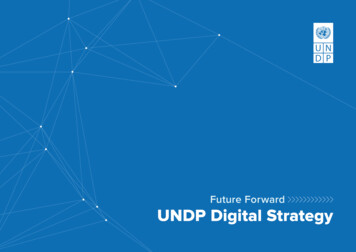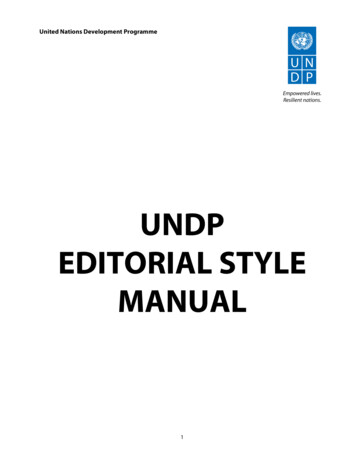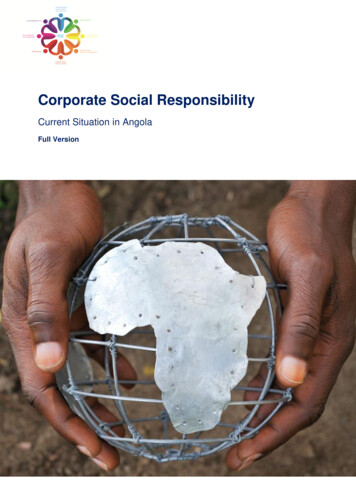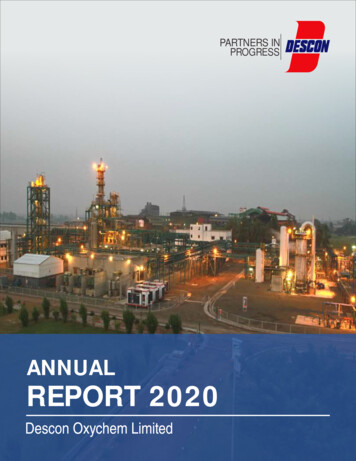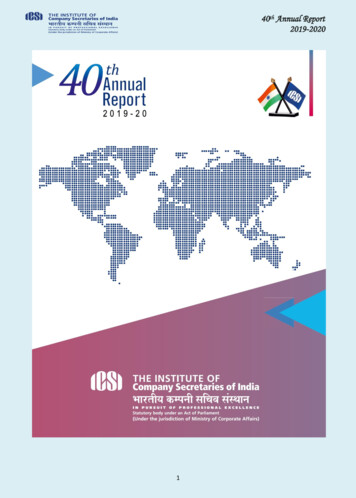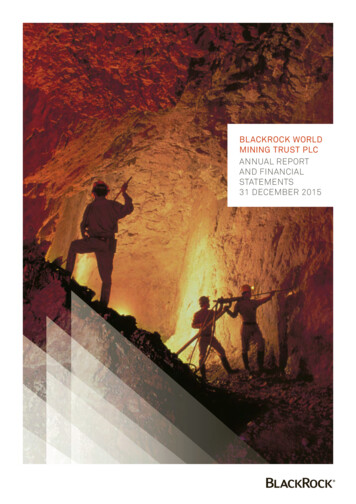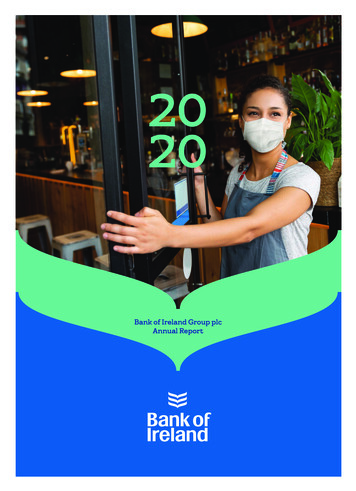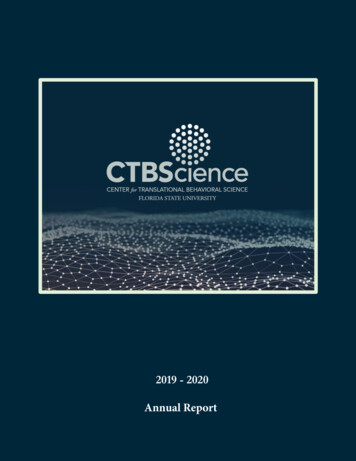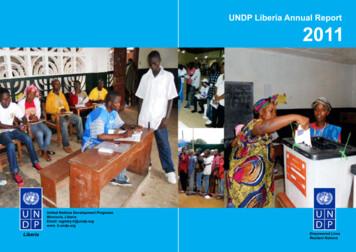
Transcription
UNDP Liberia Annual Report2011United Nations Development ProgrameMonrovia, LiberiaEmail: registry.lr@undp.orgwww. lr.undp.orgLiberiaEmpowered LivesResilent Nations
ContentsCopyright @ UNDP Liberia 2012UNDP Liberia Annual Report 2011Published by:UNDP LiberiaMamba Point, MonroviaLiberiaE-mail: registry.lr@undp.orgPage NoForewordIIIIntroduction: UNDP Country Programme in 20111Report management and oversight: Dominic SamDelivering Results:2Review Team: Cleophas Torori, Nessie Golakai, Napoleon Abdulai, Rudolf Elbling, Kns Nair,Madhumita Sarkar, Fitsum G. Abraha, Rose Muchiri, Stanley Kamara, John Walker, MosesMassah, Abibu Tamu, Samuel Ndingi, Augusta Pshorr.Deepening democracy, participation and voice: Liberia elections 20113-4Beneath the success lie co-ordination and collaboration: partnership at its best5-6Writer: Shipra BoseReaching out to citizens: decentralization and local development7-8Design Shipra BoseLayout: Albert T. Dayyeah {albert dayyeah@yahoo.com}This publication is available online at www.lr.undp.orgLiberia National Decentralization Policy: People’s Agenda9Capacity for parity10-11Photo credits:Front cover: a voter is exercising her constitutional right, casting ballotBack cover: defying heavy rain voters queue up on elections dayOther two: Voters queue on Election Day and CountingCover photos: Courtesy of the National Elections Commission (NEC)Pages 1, 7-8: LDLD programme/UNDPPages 1, 26: KMV/UNDPPages 2-4, 6, Back Cover: Courtesy of NEC and UNMIL PIOPages 10, 12: CST/UNDPPages 11, 23, 25: Shipra BosePages 13-16: JSP/UNDPPage 17: Courtesy of the Ministry of Planning and Economic AffairsPage 20: Nepali SahPage 21-22: Courtesy of the Ministry of Gender and Development & ABICPage 25(top): DIM to NIM/UNDPPage 26 (bottom): CBRD/UNDPPages 27-30: Energy and Climate Change/UNDPAll other photographs UNDP LiberiaDelivering capacities for planning, monitoring and results effectiveness12Delivering Justice and Security13-16National capacity, national ownership17Strengthening pro-poor policies and strategies18-19Of the essence: Women, peace and security and gender equality20-23Empowering community to eradicate poverty24-26Promoting green living: prevention and mitigation27-30UNDP Liberia Programme Delivery - 201131Acronyms32-33Liberia Map: LISGISI UNDP ANNUAL REPORT 2011UNDP ANNUAL REPORT 2011 II
UNDP Operation in Liberia 2011ForewordMoustapha SoumaréDeputy Special Representativeof the Secretary GeneralResident Coordinator andHumanitarian CoordinatorUNDP Resident Representativein LiberiaIn 2011, Liberia held its first nationally organized democratic elections since the end of the civil war in2003, marking a major achievement in Liberia’s post-crisis democratic development.Despite the global financial downturn, in 2011, the nation witnessed a positive turn in the economic arenawith an annual GDP growth rate of 6.9%, and significantly, the government spearheaded a major planningexercise laying the foundation for Liberia becoming a middle-income country by the year 2030.UNDP, as a trusted partner, has been providing the government with policy advice, technical expertise andsupport on the ground to realize its recovery and development agenda and to ensure peace and stabilityand the achievement of the Millennium Development Goals (MDGs). 2011 was the penultimate year ofUNDP’s current programme cycle (2008-2012). Consolidation of the gains made in the past years was animportant feature of our annual programme. We, therefore, focused in areas where our programme wasmeant to make greater impact. Keeping sustainability and national ownership in view, and to optimize thesuccesses of the past years, we supported long-term capacity development of state entities, institutionaldevelopment, leadership development and participative democracy. We ensured consistent support to thedecentralization process, expansion of the judiciary and the capacity of the justice and security sector,particularly at the local level.A major achievement in 2011 was the national elections, which saw a splendid turn up of the voters. Oursupport to the National Elections Commission (NEC) made a difference. Our efforts towards co-ordinationof stakeholders, including state entities, donors and the international community, complemented NEC’sefforts to manage and conduct the elections in a manner which was widely regarded as free, fair andpeaceful.Progress was also made in the area of pro-poor policy and strategy development. UNDP supported theMinistry of Planning and Economic Affairs in its efforts to formulate the medium and long-term economicdevelopment plan and strategy. Simultaneously, investments were made to improve local infrastructurecreating conditions for effective public service delivery and widening choices and ability of poor women,men and youth, particularly in rural areas.In 2011, UNDP delivered US 47,506 million in support of the people ofLiberia. Partnership with the Government, United Nations Mission in Liberiaand donors was vital to deliver results achieved in 2011 and presented in thisreport.This report provides an account of major achievements of the year, andhighlights some of the key results that have far reaching impacts in advancingLiberia’s development agenda for transformation and sustaining peace andstability.Dominic SamUNDP Country DirectorIII UNDP ANNUAL REPORT 2011Liberia: Socio-economic profileUNDP ProgrammesPopulation (2008 Census)Population under the age 253,480,00062.35%Decentralization andLocal DevelopmentEconomic Growth6.9%Justice and SecurityPer Capital IncomeUS 265Inflation8.5%Foreign Direct Investment47 of GDPAgriculture Contribution(Approximate)61% of GDPExport Contribution(Approximate)Life Expectancy at Birth61% of GDP55.5 yrsMaternal Mortality (per 1000live births )994Child Mortality (per 1000live births )72Literacy Rate (10 years andabove):56% m: 65.5%f: 46.3%Supporting Electoral CycleSustainable Livelihood and InclusiveFinancial SectorEnvironment and Climate ChangeYouth Empowerment andEmploymentStrengthening Public AdministrationReform & Promote Civic Engagement(National)National VisioningEconomic Policy & Management(National)UNDP ANNUAL REPORT 2011 1
Voters queue on elections dayA trainee (woman) demonstrates the use ofpower-tiller in BeajahWomen farmers weeding rice field inGuamu, KokoyahIntroduction: UNDP Country Programme in 2011The year 2011 was the penultimate year ofUNDP Country Programme 2008-2012.While consolidating the gains made inthe past years, in 2011, UNDP remainedstrategic in its support to the governmentin realizing its recovery and development goals.Organized around two main pillars, namelyDemocratic Governance and Pro-poor EconomicGrowth, the UNDP 2011 programme was fullyaligned with the Poverty Reduction Strategy (PRS)priorities and responsive to the emerging needs andconcerns. Advancing gender equality and Women,Peace, and Security, ensuring conflict sensitivity andstrengthening the capacity of public institutions wereintegral to all interventions in each of the two areas.In conformity with the Country Programme ActionPlan (CPAP) and the priorities set-forth in the UnitedNations Development Assistance Framework(UNDAF), UNDP’s assistance in 2011 in the areaof democratic governance was structured aroundresponsive and transparent governance institutions,consolidation of peace and strengthening justiceand security sector institutions, expanding people’sparticipation, including that of women, youth andrural population and advancing decentralization.Specific thrusts were placed on providing support1 UNDP ANNUAL REPORT 2011to the holding of free, fair and peaceful elections,promotion of justice, human rights, security and ruleof law, public sector reform and strengthening publicservice delivery, particularly at the local level.A major focus of the work in the area of pro-pooreconomic development was fostering inclusivegrowth and strengthening policy environment. In2011, UNDP rendered full support to the nationalvisioning exercise, the government’s longer-termvision for macro-economic development, and thedevelopment of the medium-term growth strategy,the Agenda for Transformation through Action.Support to expanding choices and opportunities ofordinary people, particularly the poor, women andyouth received equal emphasis.While government and state institutions are theprimary stakeholders of UNDP’s projects andprogrammes, its achievements and delivery are theresults of close co-operation and partnership withdonors, other UN agencies and the United NationsMission in Liberal (UNMIL), the private sector,CSOs and Women’s organizations. In 2011, UNDPcontinued to apply a hybrid of Direct and NationalImplementation Modalities in delivering on itsmandates and results.UNDP ANNUAL REPORT 2011 2
Deepening democracy, participation and voice:Liberia’s elections 2011to address tactical challenges in “real time” andavoiding any misgivings on technical matters. Thebroad-based partnership among major electoralpartners, including UNMIL, the United StatesAgency for International Development (USAIID),the International Foundation for Elections Systems(IFES) and the contributing donors to the BasketFund, namely the European Union (EU), Japan,Germany, Sweden, Spain and Denmark wasextremely useful for effective delivery on theelections targets. Technical information was readilyexchanged and implementation challenges wereopenly debated among representatives of UNDP,IFES, NEC and donors, fostering a consensus-based problem solving approach and a deeperunderstanding of the complexity of the process forall stakeholders. This complemented the strong dayto-day working relationship that was cultivated byUNDP and IFES.With a team of multi-disciplinary technical expertsheaded by a Chief Elections Technical Advisor,UNDP’s assistance enabled NEC to manage theentire electoral cycle in a professional, transparentand credible manner (see the case study). Theinternational community, particularly the observerscommended the effort and acknowledged the freeand fair environment in which the elections tookplace.A successful partnership of UNDP/UN, NEC and Donors’ delivered:priorities, which needed the political will as wellThe 2011 general elections was a litmus test for theas technical competence. Besides, the technicaldemocracy and stability in Liberia. It was the firstexpertise/support received from UNDP, a Gendernationally managed election since the cessation ofDesk with a full time staff was established at NECthe civil crisis in 2003. Hence, the significance ofto augment the efforts and address NEC’s internalthe capacity of the national institution responsiblecapacity issues.for holding the elections, namely the NationalIn addition, engaging the media, in a manner thatElections Commission (NEC) to manage suchpromotes peaceful participation and healthy debatecomplex exercise, address legal impasses, ensure fullof all concerned, was a priority.engagement of other key institutions, particularlysecurity apparatus, political parties, create a levelUnlike 2005 when UNMIL provided vitalmanagement support, in 2011, UNDP played a keyplaying-field to hold free, fair and peaceful electionswas put to the test.role in providing operationalThe post-electoral violence in Supporting the election cycle is a and technical assistance toneighboring Ivory Coast in 2010 key component of the European the NEC. UNDP was also inleft genuine concerns on the part Union’s (EU) governance portfolio charge of managing financialresources contributed byof the authority, to contain violencein Liberia. Working togetherbefore, during and after thedonors, commonly known aswith other donors to supportthe “Basket Fund”.elections, in particular. Continuedthe organization of the 2011co-ordination and collaboration elections, and further capacity UNDP worked collaborativelywith UNMIL and otherwith national security apparatus,development of the Nationalpolitical parties, UNMIL and other Elections Commission, became international partners andinternational partners, enabled more manageable thanks to good managed the delicate balancebetween extending full coNEC to hold the elections withoutcollaboration with the UNDP.”any major incident.operation to NEC and yetensuring NEC’s full controlStrengtheningwomen’sTomas NIKLASSONparticipation across the electoralover the process. This helpedEuropean Unionto ensure co-ordination atprocesses and addressing genderLiberia Officeall times, allowing partnersissues were among the key3 UNDP ANNUAL REPORT 2011 Timely procurement of and making elections equipment, items available at all levels—national, local, despite procedural and infrastructural challenges. Registration of 1,793,584 voters of which about 49% women, which represents the currentdemographic male-female ratio. Establishment of a Gender Desk at NEC and training of 453 women aspirants.Referendum held on 23 August 2011. Credible, peaceful elections held on 11 October and presidential run-off on 8 November2011.Partnership and collaboration were factors leading to overall success of the 2011 Elections Heartfelt thanks and appreciationgo to our international partners,including UNDP, UNMIL, EU, IFES, AU,ECOWAS, the People and Governmentof the United States of America, Japan,Germany, Sweden, Spain, Denmarkand the Government and People of theFederal Republic of Nigeria, for theirunflinching support to the 2011 electoralprocess which led to the resoundingsuccess that all well-meaning Liberianscelebrate today.NEC Acting Chairperson, Madam Elisabeth Nelson National ElectionsCommission announcing the final results of the 2011 Elections in the presenceof the president elect, the diplomatic corps and all senators and houserepresentatives elect.UNDP ANNUAL REPORT 2011 4
Beneath the success lie co-ordination and collaboration: partnership at its bestOn October 11, 2011, nearly 1.8 million Liberiansexercised their constitutional right to vote in the firstnationally organised Presidential and Parliamentaryelections since the end of the country’s civilconflict in 2003, marking a significant milestone inLiberia’s post-war democratic development. Womenconstituted 49% of total voters, proportionateto registered women voters. UNDP and otherinternational partners provided co-ordinated,technical and operational assistance in support to theNational Elections Commission and the Governmentof Liberia.Between October 2010 and November 2011,resources from the UNDP-Managed Basket Fund ofDecember 16, 2010Liberian National Police deployed tocounty magisterial warehouses to securefacilities and equipment ahead of voters’ registration materialsFebruary 15Voters’ registrationOMR forms retrievedAugust 4Referendum materials delivered andLNP deployed to magisterial regionsOctober 11ELECTION DAYNovember 8 -11Run-off election and retrieval of ballotpapersUS 27 million was utilized to update Liberia’s voters’roll; undertake voters’ registration; capacitatinggovernment institutions and CSOs; train womenaspirants in political participation and leadership;fund civic educators to conduct peer education andcreate awareness on women’s role and participation;hold a national referendum on provisions of theconstitution relating to elections; and procure,distribute and retrieve electoral materials for theOctober elections and November second-round,run-off. Each and every event involved multiplestakeholders and some of them involved complexlogistical operations.October 2010Technical TeamArrivesJanuary 10, 2011Voters’ registrationbeginsJuly 10 and 22training materials /manuals arrivefrom Ghana via UNMIL B75720 September - 10 OctoberDistribution of electoral materialsand deployment of LNPLogistics: one plan four times overNEC and UNDP in close co-ordination with UNMILplanned four nation-wide delivery and retrievalschedules for materials and deployment of LNPofficers for voters’ registration, the referendum,elections and run-off election. During each phase, theNEC was responsible for providing transportationfor materials and personnel. UNMIL provided airsupport for the only most remote regions in Liberia,where infrastructure is non-existent or in seriousdisrepair.With UNDP’s support, NEC produced packing plansElections load and unload 146.38 metric tons of material weredelivered and retrieved. 155 metric tons of voters’ registrationequipment and materials delivered. 82,012 polling staff were transported acrossLiberia 5,524 law enforcement officers weredeployed.for training and voting materials and voting precinctkits; delivery/retrieval plans were drawn up forair, water and land transport and staff were trainedin tracking movement and ensuring safe custody.During delivery, windows of between two andthree weeks before and after each event, materialswere transported from two of NEC’s warehouses inMonrovia to 19 magisterial areas across Liberia andonwards to 1,780 voters’ registration centers andOctober 12 -November 7Ballot retrieval and distribution ofballots for the second round run-offUNDP Resident Representative Soumarémonitors Voters’ Registration process5 UNDP ANNUAL REPORT 2011voting precincts following voters’ registration.Some materials, such as fabric voting screens, wererecycled between voters’ registration and the run-off,but each plan had to factor new ballot boxes beingdelivered to the 4,461 polling stations throughoutthe country. Each stage was a rehearsal for thefollowing, more complex event. The same base planwas used in every exercise, but modified in view ofchanging weather and infrastructure conditions andincreasing volume of materials, numbers of pollingstaff and security personnel.Trucks, pick-ups, canoes, bikes and porters werehired by UNDP with UNMIL helicopters providingair support to remote regions where poor roadsprevented delivery by trucks. Almost five timesthe number of trucks and three times the numberof pick-ups were used for the election than voters’registration to account for changes in weight andvolume of electoral materials and personnel, withthree times the number of ballot boxes required forthe Presidential, House of Representatives and Senateelections. To enable every community in Liberiathe opportunity to vote during the rainy season, thenumber of bikes, canoes and porters increased byapproximately 90%, 570% and 230% respectively,between the voters’ registration exercise and theelections in October. Despite extreme conditions,the plans designed by NEC held for each stage ofthe electoral process without any major disruptionor incident.A co-ordinated and collaborative approach tothe process, coupled with the commitment anddedication of NEC, unremitting support of UNDPand other international partners turned the 2011general elections in-to a success.Retrieval of elections’ itemsUNDP ANNUAL REPORT 2011 6
Reaching out to citizens: decentralization andlocal developmentreceived awareness and on-the-job training inparticipatory planning and community drivendevelopment as part of commencing decentralizedplanning and development management. Over 900community members—60% women—across ninecounties benefited from US 240,000 worth of LocalDevelopment Fund investment.Reaching out to citizens, prioritizing their agenda,meeting their needs, promoting parity in resourcedistribution, bringing institutions and publicservices closer to people, being the main motto ofthe decentralization programme of Liberia, withUNDP’s support, the government made huge effortsto ensure full participation of citizens—men, womenand youth, in the process.Key results of UNDP’s support to decentralization in 2011 at a glance: President endorsed the National Policy on Decentralization and Local Governance (NPDLG); A Ten Year Strategy and Broad Action Plan for the implementation of the NationalDecentralization Policy delivered; Decentralization Bill for Constitutional Amendment to elect local governments forwarded tothe Legislature; Commenced formulation of deconcentration plans by nine ministries consistent with theirmandates and functions review as part of the public sector reform; Decentralization units establishedin ministries Over 300 personnel of 12 line and oversight ministries and 15 county administrationsunderwent decentralization related training for local governments; seven training manuals in PublicFinancial Management for local government developed. Nine of 15 Counties have rolled out the preparatory functions for decentralization in terms ofinstitutional strengthening, systems and procedureParticipants at the LDLD Implementation Strategy Technical TrainingDecentralization is an important PRS focus anda crucial ingredient for democratization, peacebuilding and national reconciliation in Liberia. Withthe aim of making the government more receptive,responsive and accountable, the Government ofLiberia began its journey for administrative, politicaland fiscal decentralization in 2008. The processhas been jointly spearheaded by the GovernanceCommission (GC) and the Ministry of InternalAffairs (MIA). UNDP supported the governmentin this very important journey from the onset. Incollaboration with the European Union (EU) andthe United Nations Capital Development Fund(UNCDF), UNDP extended its technical support andco-operation through the Liberia Decentralizationand Local Development (LDLD) programme.Despite 2011 being the elections year, the GC andMIA were determined to drive the agenda and togetherdelivered the National Policy on Decentralizationand Local Governance (NPDLG) reaching a majorbenchmark. The policy was officially endorsed bythe President of the Republic in September 2011,7 UNDP ANNUAL REPORT 2011signifying a major success of UNDP’s support to thegovernment (see the case study below).While the policy instruments were being devisedand vetted, the GC and MIA in collaborationwith the Ministries of Planning and EconomicAffairs and Finance continued to make inroadsfor deconcentration and to capacitate institutionsto meet the impending change and challengesassociated with that. In 2011, massive trainingand orientation porgramme was undertaken tostrengthen the capacity of the relevant institutionsand individuals in readiness to effectively deal withthe on-going and forthcoming changes. Technicalknowledge and skills were backed by the provisionof equipment and access to technology includingprovision of VSATs to three county administrationsas part of strengthening e-governance. Over 300staff—33% women—of 12 line ministries and 15county administrations were provided with trainingand orientation during the year in planning andcommunity driven development. Additionally, over850 community participants across nine counties“ Never before we could decidefor ourselves We now know thatdevelopment is our right. We also knowthat women should be in the forefrontand directly benefit from developmentprojects ”James Duo, a Youth Activist from Beajah Community in Bomi County givingan account of benefit brought to his community by Local Development FundUNDP ANNUAL REPORT 2011 8
Liberia National Decentralization Policy: People’s AgendaThe formulation of the National Policy on Decentralization and Local Governance (NPDLG)and its approval by the Government of Liberia in September 2011 is one of the successes ofUNDP Liberia under the Liberian National Decentralization and Local Development Program(LDLD). LDLD is widely recognized as a national programme of innovations focusing onsupporting decentralization, its policy and legal framework and establishing public financialmanagement and planning procedures at the local level.In retrospect, the road to developing the NPDLG was long and intense. However, whatcan be described as its unique process and success in national ownership and leadership,was ensuring that stakeholders from every part of Liberia was involved and had a say inthe policy making process. The Governance Commission (GC), in collaboration with theMinistries of Internal Affairs and Planning and Economic Affairs went from district to districtconducting consultations on local governance, citizens’ participation, development planningand decentralization. From these consultations emerged the County Development Agenda-s(CDAs), the local component of the Poverty Reduction Strategy. Following this, career publicservants and local government experts met at the GC and reflected upon the views of theLiberian people on how political, fiscal and administrative authorities can be shared betweenthe national government and local level institutions, and how local government will functionunder such a system. This process was further informed by consultations with Liberianexperts from diverse backgrounds, leaders of political parties and the Legislature resultingin the first draft that was gender responsive. A high-level Liberian delegation consisting ofLegislators, Ministers and Government Officials undertook a study tour to have first-handknowledge of decentralization processes, the benefits, challenges and sequencing. In orderto further strengthen the peoples’ ownership of the Policy, the GC held a second round ofnation-wide consultations to validate the policy with citizens in the counties bringing togetherchiefs, local government officials, civil society, women’s organizations, media, and politicalparty leaders to ensure that the draft Policy indeed reflects the aspirations and priorities ofLiberians. It is estimated that over one and half million persons across the length and breadthof the Country were effectively reached through electronic and print media. National, regionaland community radio talk shows, decentralization street dramas and jingles in English and 14vernaculars besides numerous town hall and community meetings were also held. There werealso focus group discussions, inter-university debates and talk shows held for high schoolstudents, to ensure that the voices of youth were heard.Once the final draft of the policy was complete, the GC and MIA went back to the people. Thenation-wide decentralization policy dissemination and validation dialogues were a resoundingsuccess in terms of the quality and coverage of participation. There was general consensusthat decentralizing political, fiscal and administrative powers to local authorities was the bestdemocratic alternative to foster people-centered governance in Liberia’s reconstruction anddevelopment. The signing of the National Policy on Decentralization and Local Governanceby the President of the Republic in September 2011 was the culmination of years of a longjourney of Liberian men, women and youth for the Policy formulation process.9 UNDP ANNUAL REPORT 2011Capacity for parityCounty officials attending training in local elected leadershipThe government emphasizes the role and capacityof county authorities to advance national recoveryand sustainable peace. Enhanced capacity at thelocal level, in particular to provide administrativeand technical leadership, effectively utilize funds,improve public service delivery, manage and accountfor public finances is equally important to addressand overcome disparities, the urban-rural divide, interms of citizens’ access to public services, livingstandards and human wellbeing.In support of the government to realize PRS goals,during the current porgramme cycle—2008-2012,UNDP, in partnership with the Swedish InternationalDevelopment Agency (SIDA), UNICEF and theUNHCR intensified its efforts to enhance capacityand visibility of local administration both at thecounty and district levels. Employing a targetedapproach, UNDP supported the local authoritiesthrough the existing UN mechanism—CountySupport Team (CST). CST, by design is a multisectoral programme and it relates to all sectors,and institutions operating at the local level, whichplaces it in a unique position to influence change andpromote equity across all sectors, an underpinningof the government’s decentralization agenda.In 2011, CST was focused on three key areas relevantto capacity of local authorities and institutions: (i)administrative, technical and institutional capacityfor improved service delivery; (ii) enhancedCounty Information Management and Monitoringand Reporting System (CIMM) for evidencebased planning and accurate reporting purposes;and (iii) rehabilitation and construction of localinfrastructure at the county and district levels, allbasic requirements for operational effectiveness.Behind the success of the implementation of theprogramme was an effective partnership andcollaboration with the Ministries of Internal Affairsand Planning and Economic Affairs, the Office ofCounty Superintendants in all 15 counties and sisterUN entities, particularly UNMIL Civil Affairs Officein counties, UNHCR, UN-HABITAT, UNICEF andUNOPS among others.The programme was able to make an impactupon the context in which the national and localadministration operates. An improvement inperformance, particularly capacity for planningand co-ordination was evident. With improvedUNDP ANNUAL REPORT 2011 10
understanding of the challenges, county officialswere better able to draw plans which were effectiveand responsive to the situations on the ground,a prerequisite for effective service delivery. Theprogramme was also able to make a differencein operational infrastructure and abilities of localauthorities especially with the restoration of countyand district administrative buildings and provisionof office equipment including transportation.With over 1,200 trained local government officials inLocal Elected Leadership, Financial ghout the 15 counties, the local governmentauthority, particularly the Office of the County ofSuperintendents were better equipped to deliver ontheir mandates. The impact of the trainings was visibleas they began to gradually take over responsibilityof security, reconstruction and development in thecounties. Also evident was the ability of the CDOsto track and report on PRS/CDAs implementat
A major achievement in 2011 was the national elections, which saw a splendid turn up of the voters. Our support to the National Elections Commission (NEC) made a difference. Our efforts towards co-ordination of stakeholders, including state entities, donors and the int
